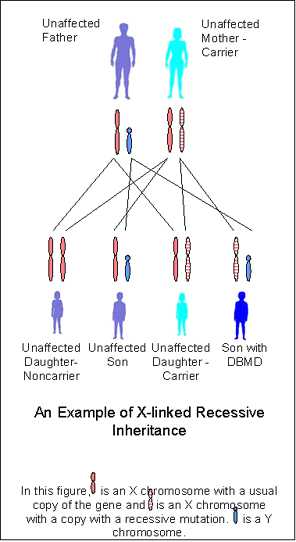How Duchenne/Becker Muscular Dystrophy is Inherited

The change in the gene that causes Duchenne/Becker muscular dystrophy (DBMD) happens on the X chromosome. A boy gets an X chromosome from his mother and a Y chromosome from his father. Only the X chromosome can have the changed gene that causes DBMD. Females almost never have DBMD because they have two X chromosomes. Even if a female has one X chromosome with the DBMD gene, her second X chromosome usually will make enough dystrophin to keep her muscles strong.
Because a female can carry (or have) one DBMD mutation and not be affected, she is referred to as a carrier. As a carrier, a female does have a risk of passing the same mutation on to her children. Each son born to a carrier female has a 50% chance of inheriting the DBMD mutation and having MD. Each daughter born to a carrier female instead has a 50% chance of inheriting the DBMD mutation and becoming a carrier like her mother.
Although most males diagnosed with DBMD are known to have inherited the mutation from their mothers, about one-third of cases are the result of a new mutation in which the mother is not a carrier. Rather, the new mutation happened randomly in the fertilized egg. In these cases, it is unlikely that other children of that same couple will be affected similarly by DBMD.
- Page last reviewed: January 13, 2017
- Page last updated: August 19, 2014
- Content source:



 ShareCompartir
ShareCompartir